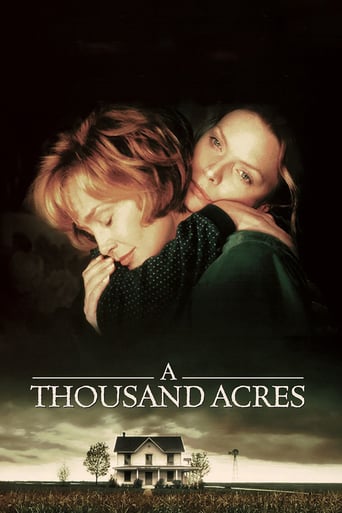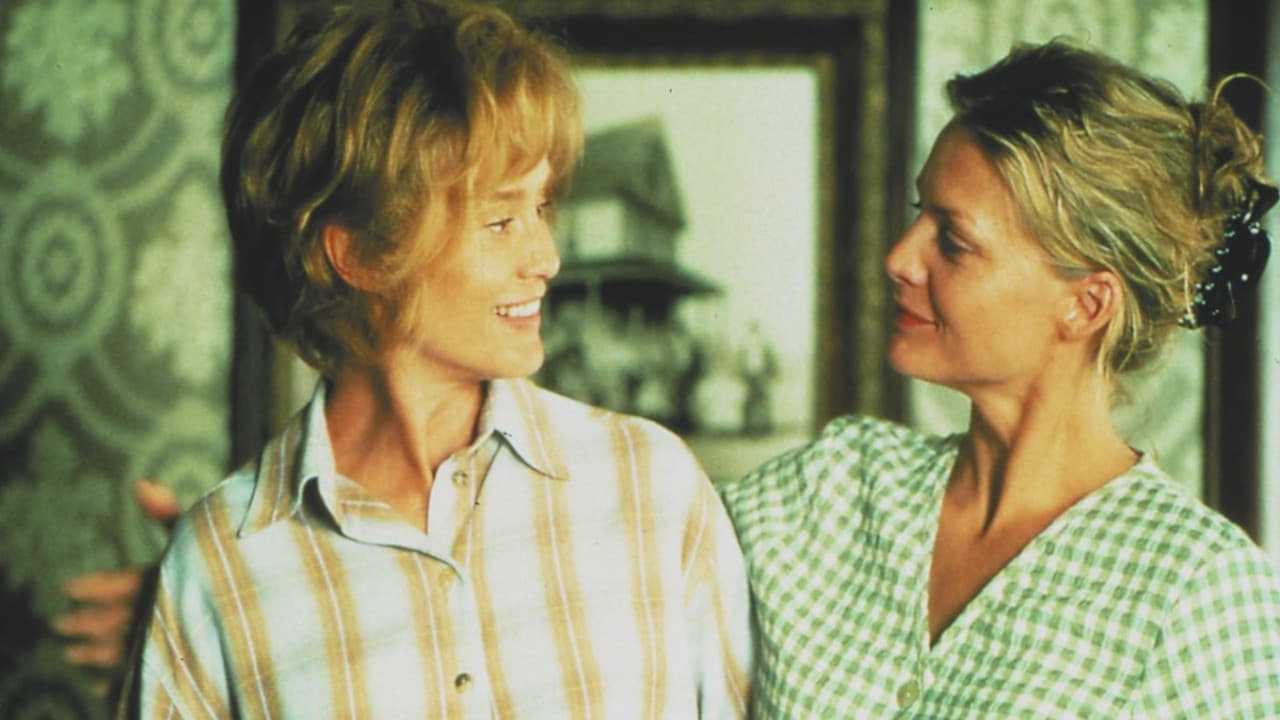Paul J. Nemecek
The two primary questions I use in evaluating a film are: "Is it a story worth telling?", and "is it a story well told?" When I apply these questions to Jocelyn Morehouse's A Thousand Acres (adapted from the novel by Jane Smiley), the answers are: yes, yes and no. The basic story is a loose adaptation of Shakespeare's King Lear. This story provides fertile soil for a tragic, but compelling story as told in Jane Smiley's novel as she moves the setting of the story to the cornfields of Iowa. This revisionist King Lear has an aging farmer (played by two-time Oscar winner Jason Robards) proposing to divide his farm among his three daughters as a way of minimizing the costs of inheritance taxes. The youngest daughter expresses some reservations, and is immediately cut out of the partnership. When the farm is divided between the other two daughters, the stage is set for a tragedy of epic proportions. As the story unfolds, the family relations are strained and broken by greed, betrayal, death, abuse, miscommunication, and ghosts from the past. When Jessica Lange and Michelle Pfeiffer read Jane Smiley's novel, they purchased the screen rights. Women are at the center of this project from beginning to end. This is actually somewhat refreshing, since Hollywood is not known for sensitivity in its portrayal of females or in its understanding of female viewpoints. Unfortunately, this has led some to dismiss the film as a "chick flick." While there are no male characters in the film for whom we feel much compassion or sympathy, the film is really about Ginny (as played by Jessica Lange). If the viewer follows the dramatic arc of this character, it is easier to find the heart of this film.Finding the heart of the film appears to be a problem. Roger Ebert gave the film two stars (out of a possible four), Owen Glieberman of Entertainment Weekly gave the film a letter grade of F. Others--myself included--liked it a bit better than that.The film is clearly not without its problems. Film adaptations are difficult because richly textured stories must be trimmed and abridged to fit a two-hour time span for the typical film. Most of the criticisms of A Thousand Acres revolve around underdeveloped characters, subplots left hanging, and unclear story lines. I suspect some of this is the result of commercial tampering and trimming by the producers. Some of the blame clearly goes to director Jocelyn Morehouse who doesn't do enough to help us care about some of the characters. When tragedy strikes, it is almost as if we are reading about strangers in a newspaper.The performances by Jessica Lange and Michelle Pfeiffer (Pfeiffer plays the second sister, Rose) are so compelling that the film remains engaging in spite of its flaws. Jessica Lange gives what may be the performance of her already Oscar-rich career (Tootsie and Blue Sky). This is a different kind of role for Pfeiffer and she clearly rises to the occasion. A Thousand Acres is worth seeing if you are interested in a good story that comes close to being well told.
zardoz-13
The tormented women in the epic tearjerker "A Thousand Acres" hope that change will brighten their lives. Instead, change ushers in nothing but tragedy. The current popular designation for movies such as this glossy Michelle Pfeiffer & Jessica Lange melodrama is chick flicks. Covering all the dirt in the life of a well-to-do Iowa farming clan, "A Thousand Acres" unravels as a soap opera about anguish, incest, insanity, adultery, and cancer, clearly qualifying this Touchstone Pictures release as a three-handkerchief extravaganza. Moviegoers not familiar with Jane Smiley's Pulitzer Prize-winning novel may prove less demanding than their more exacting literary counterparts. Unsavory as most of "Acres" is, "Proof" director Jocelyn Moorhouse and "Portrait of a Lady" scenarist Laura Jones have exercised considerable artistic restraint and good taste in their depiction of the events.Set in Iowa in 1979, "A Thousand Acres" introduces us to Larry Cook (Jason Robards), the Cook clan patriarch. He owns a thousand acres of free and clear land. Larry loves to tell the story about how his ancestors put in a drainage system and converted swamp land into profitable farm acreage. Larry stands tall in the eyes of the community and has a say in all major decisions. The Larry Cook character resembles Shakespeare's "King Lear," which essentially was the idea behind Smiley's novel. Larry's wife died from cancer, but he has three daughters: Rose (Michelle Pfeiffer), Ginny (Jessica Lange), and the youngest Carolina (Jennifer Jason Leigh). Rose and Ginny are married, Rose to Pete Lewis (Kevin Anderson) and Ginny to Ty (Keith Carradine). The older sisters have stayed at home, living in houses on either side of their father's house. Rose is raising two girls, but cancer has forced her to have a mastectomy. The only nudity occurs in the scene in the examination room when we are shown Pfeiffer's face grafted onto someone else's body.Carolina differs from her elder sisters. While they dress casually and are homemakers, Carolina is an attorney who wear her hair pulled back severely into a bun. She isn't married at the start of the movie, and her respect for Larry cannot match that of her sisters. So when Larry, in an act of overwhelming generosity, decides to form a corporation and give equal shares to everybody, Carolina balks at the offer. Furious, Larry all but disowns her, and nothing that the sisters can do will change Carolina's mind. Larry makes his relatives a gift of the farm because he feels that the inheritance tax would eat them alive. Initially, "A Thousand Acres" gets off to a happy start. Before fade-out, however, Moorhouse and Jones sling every bit of dirt they can muster.We learn that Larry has feel of clay and that Rose and Ginny differ in their temperament. While Rose is consumed by her own sense of rage, Ginny insulates herself from the shadowy past. The movie's time frame encompasses a pivotal and devastating turning point in the Cook clan. Get those handkerchiefs ready. The two elder Cook sisters square off against Carolina. Carolina accuses them of duping Larry out of his farm. The people in town are convinced that both Rose and Ginny cheated their father, too. Since Larry signed over the farm, he has either confined himself to his mansion like a shut-in or he drives around recklessly and gets drunk. Whatever generosity that he had expressed at the beginning, Larry converts now into hate, fear, and rage toward his two daughters. In an after-dark tornado sequence, Larry raves insanely and calls his daughters harlots. Eventually, the ugly truth leaks out, and the Cook clan collapses like a house of cards. As Ginny, Lange wears a glazed-eyed look and weaves a pattern of anxiety with her expressive hands. Ginny has spent her entire life repressing the truth, and her nervous gestures and posture capture this evasion. Lange's performance is very mannered, and the matronly wardrobe that her frumpy character wears dilutes Lange's sensuous Hollywood persona. She has landed the choice role in "Acres." Ginny is the only character that expands and changes. Lange is such a seasoned performer that she makes all of this fidgeting seem completely natural. As Rose, Pfeiffer gets to fulminate and fire off at those people that she hates. Pfeiffer has clearly gotten the flashy role, and she wrings every morsel of thespian disgust out of it. Rose's revulsion for her father is almost as destructive as the cancer she fears will engulf her, and she is not more charitable to her scummy, insensitive husband. Pfeiffer's character could easily qualify as the film's villain, though that role belong to Jason Robards' guilty patriarch.Ideally cast as the father, Robards plays a parent whose paternal instincts have grown pretty base. Indeed, the script makes little mention of Larry's crisis, but Robards lets it erupt in a hypnotic performance that is all the more evocative considering his brief appearance on the screen. His scene on the witness stand in court reveals how a talented actor can present character without having to spell it out. This style of grim acting comes easily to Robards who legendary reputation in the American theatre derives from his tortured Eugene O'Neil characters. Robards actually resembles one of "Jurassic Park's" predatory T-Rex dinosaurs with his sunken eyes, sullen expressions, and occupational sneer. The performances alone are worth the price of admission. Nobody is miscast. Keith Carradine's famer husband is probably the only straightforward character who emerges from these disasters with his honesty intact. Pfeiffer and Lange endow their performances with a sisterly blend. Nevertheless, as sisters, they remain inevitably different. By the time the movie concludes, these sisters have confessed what they could never have yielded in less strenuous circumstances.Director Jocelyn Moorhouse, whose credits include "How to Make an American Quilt," has crafted an elegiac saga of a family in disintegration. Definitely not a feel-good movie, "A Thousand Acres' is rather an emotional lobotomy that will leave you feeling sad but relieved.
retromomma
I watched this movie, having never read the book, and took the characters at face value, but having already been introduced to them, watched it again recently. I got a whole different viewpoint out of the film.Without the burden of having to focus intently on each character, learning their quirks and foibles, allowed me to focus on the cultural issues laid out in the film. The farm families of Iowa are so intimately inter-related as they are in the area of Indiana where I grew up in the 40's and 50's that I immediately recognized the back-stories and motives behind the characters. Perhaps, Jane Smiley did mean for us to see beyond the superficial into the world these people had to live, but viewers are so caught up in the "Hollywood" aura of the individual actors that they miss a rich layout of a lifestyle that exists less and less as each decade passes. Another film with these characteristics is the "Bridges of Madison County". Try watching both of these films again with an eye to the whole picture.
tedg
Spoilers herein.This is a not incompetent soap opera. And Michelle is uncharacteristically competent. But it is an antiLear -- don't be fooled by the superficial similarity of three daughters and a will.The play has Lear as an innocent pawn of his own vision. The play is about vision and naming, and demons manipulating reality through the audience. It is immensely sophisticated.This drek is merely a play about a bad man. Nothing sophisticated at all.



 AD
AD



